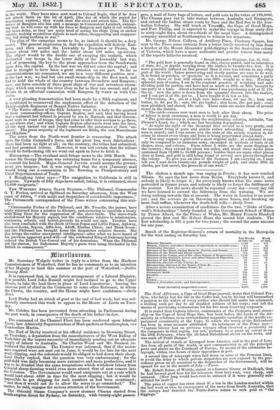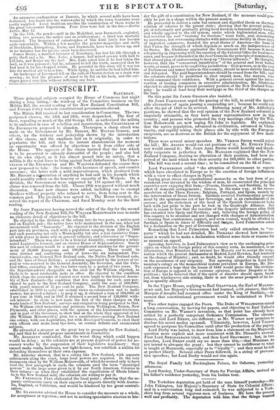3itigrt11autints.
Mr. Secretary Walpole writes in reply to a letter from the Harbour Commissioners of Waterford, that he has no commands as to an intention of her Majesty to land this summer at the port of Waterford.—Dublin _Evening Mail.
It is rumoured that, in any future arrangement of a Liberal Ministry, it is possible Lord John Russell might feel inclined to go to the Upper House, to take the lead there in place of Lord Lansdowne; leaving the onerous post of chief in the Commons to some other Reformer, in whom the Crown, the country, and the House might have confidence.—Daily News.
Lord Derby had an attack of gout at the end of last week, but was suf- ficiently recovered this week to appear in the House of Lords on Tues- day.
Mr. Cobden has been prevented from attending in Parliament during the past week, in consequence of the death of his father-in-law.
The command of the Channel Fleet has been conferred upon Admiral Corry, late Admiralty Superintendent of Mail-packets at Southampton, vice Commodore Martin.
The Earl of Derby received at his official residence in Downing Street, on Thursday, a deputation from the manufacturers of the West Riding of Yorkshire on the urgent necessity of immediately sending out an adequate simply of labour to Australia. Sir Charles Wood and Mr. Denison in- troduced the deputation. The Premier was informed, that if the assist- ance required were not sent out in June, it would be too late for the next wool-clipping, and the colonists would be obliged to boil down their sheep. Lord Derby replied, that the question was very embarrassing; for the gold-field was daily becoming more extensive and more productive, and it Was to be dreaded that the same temptations which withdrew labour from Colonial sheep-farming would even more attract that of new comers into the Colonies. The Government would send emigrants out at a rate which Would land about 4800 in time for the next clipping ; but it would be impossible to get shipping for such numbers as had been mentioned ; "and then it would not do to allow the sexes to go unmatched." The matter, he said, engages the serious attention of the Government.
The Oriental Steam Company's screw steamer Chusan started from Southampton direct for Sydney, on Saturday, with twenty-eight passen- gers, a mail of forty bags of letters, and gold coin to the value of 139,000/. The Chusan goes out to take station between Australia and Singapore, and extend the Indian steam route by Suez and the Red Sea to the Aus- tralian Colonies. She will touch at Tenerife, the Cape of Good Hope, and Port Phillip, and is expected to make. the voyage in from sixty-five to sixty-eight days, about two-thirds of the usual time. A distinguished company assembled at Southampton to witness her departure.
Mr. George Nelson Collyns, of Artillery Place, Finsbury Square, has sent to the Times some extracts from a letter lately received by him from a brother at the Mount Alexander gold-diggings in the Australian colony of Victoria, which have a more authentic and precise tenour than many of the reports hitherto received.
"Mount Alexander Diggings, Jan. 18, 1852.
"The gold here is generally found in clay, clayey gravel, and in interstices of slate, &e. at depths varying from the surface to twenty-five feet. It is more generally diffused on this ground than it ever was known in any other part of the world : hence persevering and steady parties are sure to do well. It is found in patches, or pockets,' as it is termed, and sometimes a party of; say, three or four will obtain over 501b. weight in a day. Having a splendid pair of scales, I am in the constant practice of weighing and sub- dividing gold for parties, and have had as much as 201b. or 301b. brought by one party at a time. About a fortnight since I was purchasing gold at 21. 178. the oz. : now the price is down from the quantity thrown into the market, and I can get it at 50s. per oz. I have bought it as low as 45s. "Provisions, &c., are at a high rate here—flour, 5d. per lb. ; ham and butter, 2s. 6d. per lb. ; oats, 188. per bushel; slop boots, 24s. per pair ; com- mon pitchfork and shovel, 10s. each. These rates are under those of several stores in the district.
"The cattle-owners now want men to look after their sheep. The price of labour is most enormous, a man is worth 11. per day. "The gold-discovery is ruining the neighbouring colonies, Adelaide, Van Diemen's Land, &c. ; which are fast becoming depopulated. "At night the sight of the thousand fires around us is very pretty, and the incessant firing of guns and pistols rather astounding. Almost every mania armed; and I can assure you the state_of the society requires it, for crime in almost every shape and form is being perpetrated almost daily. "You may suppose a gold-field a most original sight ; at a distance it can only be compared to an immense army, encamped in myriads of tents of all shapes, sizes and colours. From where I write are the main diggings in the country ; they extend for about ten miles, and about three weeks since contained from 12,000 to 15,000 persons; besides there are many other places close at hand, and gold is still being found at several new places throughout the colony. To give you an idea of the business I am carrying on, I may tell you I sent down twenty-six pounds weight of gold, and about 2001. in checks, per last escort, the proceeds of one week."
The cholera a month ago was raging in Persia; it has now reached Silesia. So says the last news from Berlin. Everybody knows it, and nobody is likely to forget it ; for everybody knows what the same news portended in former years, and nobody is likely to forget the fulfilment of the portent. Yet the news should be repeated every day—every day till we have learned to extract the bitterness from the warning. We are doing nothing towards this at present. The water in London is no purer yet ; and the sextons go on throwing up more bones, and breaking up more frail coffins, whenever the death-bell tolls.---.Daily News.
After a severe examination of candidates for the two "Duke of Corn- wall's Scholarships" lately founded at the Government School of Mines by Prince Albert, for the Prince of Wales, Mr. Henry Francis Blanford proved the first and Mr. Robert Hunt the second best students. The first scholarship is 30/. a year for two years ; the second the same amount for one year.
Result of the Registrar-General's return of mortality in the Metropolis for the week ending on Saturday last.
Zymotie Diseases Dropsy, Cancer, and other diseases of uncertain or variable seat
Tubercular Diseases •
Diseases of the Brain, Spinal Marrow, Nerves, and Senses Diseases of the Heart and Blood-vessels Diseases of the Lungs, and of the other Organs of Respiration ...
Diseases of the Stomach, Liver, and other Organs of Digestion
Diseases of the Kidneys, &c Childbirth, diseases.of the Uterus, &c Rheumatism, diseases of the Bones. Joints, die
Diseases of the Skin, Cellular Tissue, &c
Malformations Premature Birth Atrophy Age Sudden Violence,Privation, Cold, and Intemperance Total (including unspecified causes) 1,743 471 1,945 1,146 301 1,268 674 90
8o
73 11
so
220 138 487 107 314 — 9,073 .... .... .... ....
•••• •••• ••• • •••• •••• ••••
• ••• •••• •••• •••• •••• ••••
• ..• 234 46 200 121 46 169 74 8 11 2 1 33 30 46 3 34 1,070 The Zuid Airier:an, a Cape of Good Hope journal, states that Colonel For- dyce, who lately lost his life in the Caffre war, has by his last will bequeathed a pension to the widow of every soldier who should fall under his command, a shilling each per day to all disabled soldiers of his corps ; and left the means of purchasing commissions for his five most deserving sergeants.
It is stated that Captain Glover, commander of the Propontis mail steam- ship on the Cape of Good Hope line, has been before the Lords of the Ad- miralty in reference to an extraordinary magnetic variation of the needle ex- perienced occasionally at the Cape, to which the wreck of the Birkenhead has been in some measure attributed. An informant of the Times says- " Captain Glover had on previous voyages often observed a peculiarity in the compasses in that region, but not, perhaps, to so great an extent as on the 25th February, when the ill-fated Birkenhead struck on the rocks, and was sunk off Point Danger."
The arrival of vessels at Liverpool from America, and in the port of Lon- don from all parts of the world, is now communicated to all the principal ports and places on the Continent of Europe, by means of the submarine te- legraph, within two hours of their appearance in port. A second line of telegraph wires laid down on some of the Prussian lines, to avoid the delay to which private despatches are now exposed by the _pre- cedence given on all occasions to the despatches of the Government, will be opened for use in the month of July.—Times. Mr. Robert Baker, of Writtle, stated at a farmers' dinner at Hadleigh, that he had brewed good beer for his labourers from beet-root, very cheap, and untaxed. [How long would beet-root be untaxed if it were generally sub- stituted for male] The price of copper has risen about 51. a ton in the London market within the last week or two, in consequence of the news from South Australia, that the miners had deserted the Burm-Burm mines to seek gold at 4th
diggings."
Ten Weeks Week of 1841-60. of 1851.
An extensive conflagration at Dantzic, by which several mills have been destroyed, has burnt also the waterworks by which the town fountains were partly supplied. Loeal tradition ascribes the construction of these works to the great astronomer Copernicus. Four lives were lost in the fire.—Berlin Letter, May 12.
On the 11th, the powder-mill in the Muhlthal, near Darmstadt, exploded, killing two persons, the miller and an artilleryman ; a third was mortally wounded. The frequency of catastrophes of this kind lately has become quite remarkable. Within a few months the powder-magazines and mills of Stockholm, Konigsberg, Turin, and Darmstadt, have been blown up, and in no instance has the precise cause been discovered.
James Rosier, a married labourer of Ramsbury, has lost his life through a petty theft and a lie. Mrs. Luke, a farmer, had mixed arsenic with lard to kill rats' and Rosier ate the lard. Mrs. Luke asked him if he had taken the lard, as it was poisoned ; but he, ashamed to tell the truth, answered that he had used it for his chapped wrists. He persisted in this story till it was too late for medical aid to save him. While dying, he said the lie had killed him.
An innkeeper of Liverpool fell on the rails at Chester station as a train was moving ; he had the presence of mind to lie flat on his back, and the car- riages passed over him without inflicting any hurt.



























 Previous page
Previous page